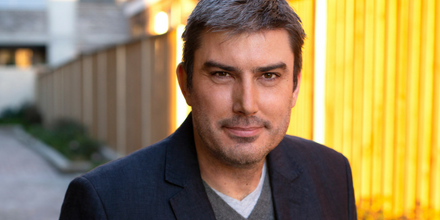It always seems a great shame to me how there will sometimes be a sudden rash of fiction published with similar themes. What generally follows is that the biggest marketing budget wins, at least until word of mouth takes over from the machine, and the true readers’ favourite starts to tick over as a backlist perennial.
 This time two years ago there was a tussle going on between Mr Rosenblum’s List and Major Pettigrew’s Last Stand and somehow the two books seemed to meld in the minds of the public. Mandy Sayer was just one of several Australian authors whose books about wartime Sydney, lost and found love with an American soldier (in Sayer’s case called Love in the Time of Lunacy) had to battle it out on the shelves around the middle of last year. Last month we were presented with Wonder, The Cartographer and Memoirs of an Imaginary Friend, all of which purport to speak in an authentic child’s voice and all of which are really very good, although having read all three, I do think Memoirs of an Imaginary Friend is clearly the strongest.
This time two years ago there was a tussle going on between Mr Rosenblum’s List and Major Pettigrew’s Last Stand and somehow the two books seemed to meld in the minds of the public. Mandy Sayer was just one of several Australian authors whose books about wartime Sydney, lost and found love with an American soldier (in Sayer’s case called Love in the Time of Lunacy) had to battle it out on the shelves around the middle of last year. Last month we were presented with Wonder, The Cartographer and Memoirs of an Imaginary Friend, all of which purport to speak in an authentic child’s voice and all of which are really very good, although having read all three, I do think Memoirs of an Imaginary Friend is clearly the strongest.
It is rather unfortunate then that both Defending Jacob and The Good Father are coming out within a month of each other. Both are about the relationship between a father and his son. Both revolve around whether or not the son has committed an unspeakable crime. Both are supposed to be excellent.
I haven’t read William Landay’s Defending Jacob but within two weeks of its US publication, it was topping the NY Times charts and it certainly has had some very good reviews, most of which focus on it being a legal thriller in the vein of Scott Turow.
 I have read Noah Hawley’s The Good Father which will be published in April but I can tell you that this is no legal thriller. It is all together a different beast.
I have read Noah Hawley’s The Good Father which will be published in April but I can tell you that this is no legal thriller. It is all together a different beast.
The book opens with notes from a police report. They describe a young man purchasing a Trojan 9 mm gun. The gun is used to shoot and kill the Democrat nominee to the US presidency. There is photographic evidence of a young man holding the gun seconds after it went off, executing its deadly mission with perfect accuracy. The report goes on to describe the life of the young man as he drifted across the US over the previous 18 months – a “hobo losing himself in the great American absence”. The man was 20 years old. The report concludes, and its reader muses over its contents. The prologue ends:
“Who was this boy and how did he become a man in a motel room fondling bullets? What made him ditch his comfortable life and embrace an act of barbarity? I have read the reports. I have watched the footage, but the answer continues to elude me. More than anything else, I want to know. I am his father, you see. He is my son.”
The Good Father is told through the eyes of Dr Paul Allen. Dr Allen is a respected and established rheumatologist. He is happy, leading a quite domestic life with his twin twelve year olds and his second wife. Their world is shattered while watching the evening news as Paul’s 20 year old son from his first marriage, Danny, now apparently known as Carter Allen Cash, is accused of murdering the most high profile candidate in America at a presidential election rally.
What follows is an exploration of fatherhood, of self, of loyalty, of obligation, of identity and perhaps, of the limits of unconditional love. There are wonderful insights into family, into connection and disconnection, and what it is like to watch someone decide to simply slip away from their moorings. Allen is convinced that Danny is innocent although that is looking less and less likely as the book goes on. What is interesting is that he examines the evidence with the same razor sharp deduction that he has to use in his medical practice as a diagnostician. He tests the evidence, he weighs each theory, he discounts neither the obvious, nor the outlandish explanation. But the closer he comes to Danny, the closer he comes to an ugly truth, a truth about himself as a father.

Noah Hawley
While Dr Allen continues to champion the cause of his son, he jeopardises both his marriage and his career. He has become a pariah – the father of the boy who killed America’s hope. He is torn between loyalty to his firstborn, with whom he has had less and less contact over the years, and loyalty to his fiercely loving twins.
Noah Hawley uses a surgeon’s precision to slice away at identity until Dr Allen is laid bare, no longer sure of who he is or what he stands for. He piles twist upon twist so the reader is constantly on edge, constantly questioning the nature of truth and the nature of reality. And he ratchets up the tension until the very last page.
Comparisons will be made with Lionel Shriver’s We Need to Talk About Kevin, but there are some obvious differences. What is most interesting about the The Good Father is that it takes the male perspective, and Danny certainly came into the world loved and wanted.
Along the way, Dr Allen looks to other American assassins and/or cult leaders – Sirhan Sirhan, Lee Harvey Oswald, unabomber Ted Kaczynski, Branch Davidian David Koresh – for answers as to whether Danny could be guilty or not. These ponderings are both informative and fascinating.
This is an intense psychological novel told from the points of view of both the guilt ridden father and the meandering, ruminative son. This all adds up to create an intensely powerful book that is gripping from start to finish, and is beautifully written. It offers a fascinating, absorbing and intimate portrayal of a successful, intelligent and fundamentally good man who is forced to re-examine his whole behaviour as a father in the light of one dreadful action. It also is a startling depiction of what happens in adolescence when a child becomes a lost soul.
The Good Father is available to order from Booktopia here.
[youtube=https://www.youtube.com/watch?v=qpOYYfosAKc]





 REVIEW: Assistant to the Villain by Hannah Nicole Maehrer
REVIEW: Assistant to the Villain by Hannah Nicole Maehrer  REVIEW: Emboldened by Belinda Alexandra
REVIEW: Emboldened by Belinda Alexandra  REVIEW: The Girl on the Page by John Purcell
REVIEW: The Girl on the Page by John Purcell
Comments
No comments